
Banner

Eminent SA writers have their say on Israel
Published
8 years agoon
By
adminANT KATZ
YOU MUST READ THIS AND THE LINKS
In the first part of this article, “21st TRIP IS REEVA’S FORMIDABLE CHERRY” Jewish Report explained to readers how Reeva Forman was the pioneer of the Israel educational trip concept, having started introducing people to the Holy Land back in 2002 – slap bang in the middle of the second Intifada!
We explained how taking such trips a very valuable endeavour – but has become passé for Reeva as hundreds of people are taken on dozens of educational tours annually.
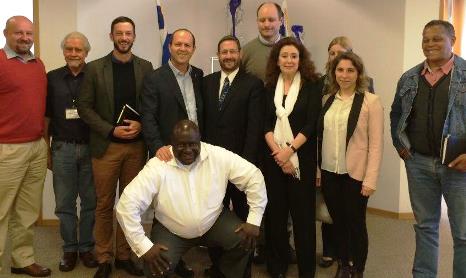
The group with Jerusalem mayor Nir Birkat
And so Reeva has progressed from taking general groups, to taking political, financial and general media editors as well as financial and economic strategists and the tour includes visits to Israel, Jordan and the Palestinian territories.
Reeva has just returned with an eminent list of guests who have published so much about their own Israel experiences, the good, the bad and the ugly, which is just the way Forman, the honorary life vice-president of the SA Zionist Federation, likes it. It is raw, real and honest…
In “21st TRIP IS REEVA’S FORMIDABLE CHERRY” – Jewish Report touched on some of these writings. We publish them more completely here.
The ISRAEL NOW ECONOMIST TOUR 2016 was an outstanding success, say the high-powered delegates. We will let them tell their stories below:
The scholastic approach…
 We have already published (with kind permission of course,) ON THE ORIGINS OF “RACISM” by Dr James Myburgh, the publisher and editor of www.PoliticsWeb.co.za as a guest blog on March 16.
We have already published (with kind permission of course,) ON THE ORIGINS OF “RACISM” by Dr James Myburgh, the publisher and editor of www.PoliticsWeb.co.za as a guest blog on March 16.
Myburgh, one of Forman’s guests, examines the common belief that “privileged” racial minorities can never be victims of this type of evil – in other words, blacks in South Africa can’t be racists any more that Arabs in the Middle East or Kurds in Turkey.
This has proven to be a popular read on the website and is well worth looking at – even printing as a Shabbos read – because it offers at once a completely different viewpoint and at the same time Myburgh shows, in his scholastic manner, the similarities between the inhabitants of the eastern shores of the Mediterranean and those who dwell on the bottom end of Africa.
The transposing of David & Goliath…
Rapport editor Waldimar Pelser, was also a guest of Forman’s and he published his own impressions of his experience. He cleverly transposes David and Goliath, where Goliath is now Israel, and heads his lengthy piece “Goliath is also scared!”
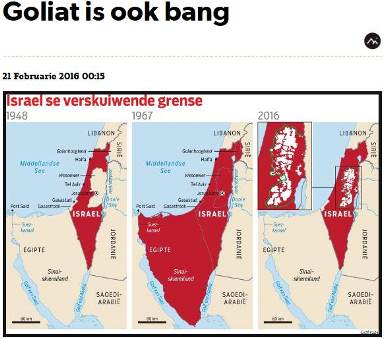 Pelser’s original text was written in Afrikaans and can be found HERE. For this reason, Jewish Report has elected to paraphrase some sections while others are direct quotes.
Pelser’s original text was written in Afrikaans and can be found HERE. For this reason, Jewish Report has elected to paraphrase some sections while others are direct quotes.
Writing on the Jewish State’s reputation as the Middle East’s only democracy, Pelser says one incident stands out in particular: “As with every case of conflict in this blood-soaked region of the world”, he writes, “there is a background to every story”.
The background tells a small part of the story about why Jews and Palestinians, much like South Africans, have long sought ways of living together. But in the Middle East today, he says, there is more and more fervour to seek an amicable divorce.
He was taken in by the events that began last October. “It’s a daily thing, this,” he says. “Palestinians – even teenagers – attack Jews – civilians as well as soldiers – with knives.”
They do it throughout what Pelser describes as: “This disputed strip of desert where, since 1948, Israel had built a thriving hi-tech economy offering more civil liberties than any other Middle Eastern country.”
However, wrote Pelser, the vast majority of Israelis know that they have to remain strong to prevent a hostile takeover by Palestinian people who want to wipe Israel off the map.
“We must protect ourselves from organisations that want to evict us,” Tal Elal, a politician in the desert city Beersheba explained. The 55-day Gaza War in 2014 was precipitated by, for example, 183 missiles from Gaza landing on Beersheba.
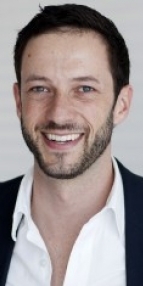
RIGHT: Rapport editor, Waldimar Pelser
You always feel death is near, a fellow editor of a daily paper with a son doing military service told him. “We try keep deaths to a minimum among people who are trying to kill us.”
While Israelis’ anxiety about terror is right, says Pelser, their actions tend to reverse the biblical role – making the world think that Israel is Goliath, the bully, while the Palestinians are little David.
Israelis, who try to protect their beloved homeland’s reputation, say their Palestinian enemies are driven by hatred of Jews.
Jews are barbaric monkeys
The Facebook page of Fatah last year claimed that Mossad planned the terror attacks in Paris to turn the world against Muslims. Palestinian TV show nursery rhymes where Jews are depicted as “barbaric monkeys”.
Tal Elal told Pelser: “Young children are taught to hate us, to kill us in the name of jihad.” For him, a 14-year-old teenager with the knife is proof of this.
In Ramallah, however, Pelser met London School of Economics-educated Dr Husam Zomlot, who told him of Palestinian impatience. Zomlot said he is an activist. Not against Israel or Jews, he says, but against Israeli occupation, settlements, “Israel’s denial of our basic rights”. Zomlot said: “Our strategy now is to make the Israeli society uncomfortable.”
What about Israelis’ fears? asked Pelser. Zomlot had little sympathy: “Israel has no right to complain about safety as long as they are acting illegally. We are not innocent. We make very many mistakes – random killings of people on a bus? What a stupid Palestinian error.
Does he approve of the simple, primitive use of missiles (from Gaza)? “Of course not! It is suicide,” says Zomlot. “This causes chaos.”
From Klerksdorp to chaos
Keith Elan Isaacson, originally from Klerksdorp, lives right on the border of Gaza, 1,3 km to be exact. He went to Israel with his wife in 1975 and is now in charge of security for the Eshkol region where about 15,000 people live on 32 kibbutzim.
They live in fear for Israel’s “Iron Dome”, a space-age missile defence shield that fires at rockets launched from Gaza before they can land in Israel. But it doesn’t work for those near the border.
The sirens are silent, the bomb shelters empty. But silence, says Isaacson, means only one thing: “They (Hamas) get ready. We see how they are doing training. They build tunnels. They experimented by shooting missiles into the sea. It’s just a matter of time.”
He remembers the day in July 2014 when Hamas attacked the area with 4 800 missiles – forcing Israeli counter-attacks which claimed the lives of more than 2 200 Palestinians.
“We live a life of self-defence. Families need counsellors. Children of 15 wet their beds. The closer you are to the border, the greater people’s fear because of the tunnels,” Isaacson told him.
The political situation
The terrorist threat makes it increasingly difficult to maintain Israel as a “democratic Jewish state”, Yair Lapid, former minister of finance, told Pelser and the other editors.
“2006 (the year after Israel’s withdrawal from Gaza) was a national trauma. We had done everything asked of us by the international community. Rather than building hospitals or schools, Hamas built terror tunnels and whip their people on to jihad.
“We know 900 to 1 200 people are currently digging tunnels under the border with material we send them in 900 trucks every day,” says Lapid.
Israel is sending the building material for Gazans to rebuild their homes, schools and other infrastructure – but Lapis says it is being used for military purposes.
Israelis live in fear of a military withdrawal from the West Bank, says Rapport editor Waldimar Pelser. Just look at what happened after Israel withdrew from Lebanon in 2000. The Iran-backed terrorist group Hezbollah’s missiles started raining down on Israel. And look at Hamas in Gaza, said Michael Oren, a member of the Knesset for the Kulanu party. “I know of no country in history that had not faced this kind threat to its existence.”
Pelser says that in Palestine democracy is waning under an unelected government and Israeli military occupation – pouring on the fire.
In Israel, Jews – both religious and secular – struggle with the question: “Can we have our beloved democracy as well be a secure Jewish state?”
Goliath’s fear, and his sometimes terrible blows, feed David’s hatred, and sometimes lead to hateful acts.
The I-learned-so-much approach…
Temba A Nolutshungu of the Free Market Foundation sent Forman the following letter after the trip:
Dear, dear Reeva,
I hope my overall comments will suffice. It was a splendid programme as reflected to some extent by divergent views on factor/s that have contributed to the Israel/Palestinian tensions and continue to exacerbate situation. I was most impressed by the honest and objective talk by Mr Bassem Eid. His Palestinian background and having been involved in the Intifada, does not cloud his judgement at all. In a way he came across as the voice of reason and thus reinforced my overall view and conviction that ultimately the good people will prevail over the radical unaccommodating sectors on both sides.
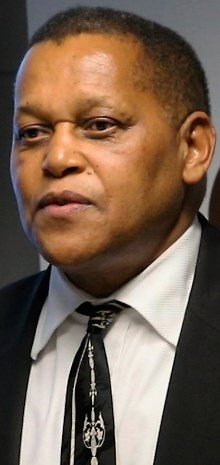 This will happen as people on both sides become emboldened by the realisation that peace and prosperity will come about as the appeal of radical sectors gradually becomes marginalized.
This will happen as people on both sides become emboldened by the realisation that peace and prosperity will come about as the appeal of radical sectors gradually becomes marginalized.
Despite Bassem’s depiction of the prevailing stark realities, strangely, he gave me reason to be hopeful about the future.
LEFT: Temba A Nolutshungu
of the Free Market Foundation
To some degree, at some point this was underscored by Ambassador Hussam Zomlot when he articulated the view that the area (Israel/Palestine areas) was geographically at the centre of the world, with tremendous potential to take off economically given its rich cultural and religious heritage collage.
Having taken in the essence of all presentations, my overall impression is that the inputs were enlightening and thought-provoking and thus intellectually rewarding, leaving one feeling empowered to confidently engage in and perhaps to also proactively contribute to the debate on an open-minded, rational and objective basis without being influenced by narrow vested political interests.
Lastly, in the end I also felt strongly that it is just plain ludicrous for anyone to take a view or even comment on the Israel/Palestinian issue without having listened to a whole range of views that reflect a highly complex situation.
In this regard, interacting with various representative individuals/entities in the country itself is a necessary precondition, the way I see it.
It was indeed a privilege to be part of this intense and comprehensive programme.
The SA’s shooting itself in the foot approach…
The SA Institute of Race Relations’ CEO Frans Cronje, heads what was the most prominent anti-apartheid think-tank and played an important role in securing SA’s political settlement of the 1990s. The Institute remains a valuable think-tank for our young democracy.
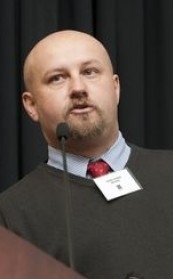 Cronje wrote the following piece which was published on the TimesOfIsrael.com.
Cronje wrote the following piece which was published on the TimesOfIsrael.com.
South Africa is ground-zero for the global boycott disinvestment and sanctions movement. The prominence of this movement is reflected in the SA media, academia, most civil society groups, and in the SA government and ruling party all having taken vociferously anti-Israel lines.
RIGHT: South African Institute of
Race Relations CEO Frans Cronje
The apartheid analogy is regularly drawn – which coming from SA – further quashes Israel’s global standing.
Yet SA’s own reputation is also in need of attention. Once Mandela’s ‘rainbow nation’ the country’s standing has been battered by a series of corruption scandals, human rights abuses, threats to democratic institutions, increasingly weak economic performance, strained foreign relations, and an unfortunate voting record in the united nations.
It is therefore very interesting, as I have just done, to spend a week as a South African on a fact-finding mission to meet senior political and businesses leaders both in Israel and the West Bank.
As we toured the tech-parks of Israel, peered through binoculars into Gaza, and travelled through the villages and settlements among the olive groves of the West Bank my thoughts – for now beyond the imagination of diplomats in both nations – increasingly became whether the two countries might find mutual redemption in each other.
Meeting with Israeli leaders the inference is unavoidable that attitudes have hardened and the country’s politics have moved further to the right. Events in Gaza following the Israeli withdrawal, election of Hamas, and the subsequent rain of missiles contributed to this. So too has the effective, if undeclared, current third-intifada. Yet the view of many Israelis and Palestinians alike was that the obduracy of the Israeli right will destroy the Zionist dream.
The expansion of settlements into the West Bank, for example, risks ensnaring that dream in a political quagmire from which it will never be able to extract itself. More convinced than on my first visit (three years ago), I left Israel certain that if the Zionist ideal dies, it will die in the new settlements of the West Bank.
On the Palestinian side my impression was of a leadership in disarray. Leadership elections have been delayed, different factions are in conflict, and Hamas continues to take a line that denies Israel the right to exist. A number of Israeli political leaders made the point that this makes it very difficult to negotiate over the West Bank.
With whom should Israel negotiate?
Who can rightly claim to be the true representative of the Palestinian people?
At face value the Fatah line is far more accommodating than that of Hamas but could an agreement struck with Mahmoud Abbas, for example, be revoked in time on the grounds that he is not an elected or representative leader of the Palestinian people?
What guarantee can there be that Palestinian factions, and fundamentalist third parties, will not descend on each other after a settlement, tearing the West Bank apart into “a blood soaked mess of wars within a war” as the economist recently described in Syria?
These questions, rightly preconditions for any settlement, are too easily brushed aside by Palestinian leaders and Israel’s critics.
STORY CONTINUES BELOW PICTURE:

Saul Singer presenting “Start-up nation” to the (clearly enthralled) eminent South African group at Start-Up Nation Central
Then there is the comment that some in the Palestinian leadership do not want to win the struggle for independence but would rather remain engaged in a perpetual struggle against Israel – in order to avoid the scrutiny of, responsibility for, and accountability to, the Palestinian people that would come with governance.
The odds of a settlement seem to be further complicated by changes in the broader Middle Eastern environment, most notably the rise of ISIS and ultra-radical brands of Islamic fundamentalism. This appears to have had the effect of causing some moderate Arab leaders to consider whether the timing is right for the West Bank to go it alone. Proposed land swaps, for example, have little chance of success if Arab communities currently in Israel remain fearful of a future outside of the security offered by Israel – despite their discontent at living under Israeli control and their principled support for an independent Palestinian state.
So too is the case for many Palestinian citizens living under Israeli occupation in the West Bank who must look to Gaza (let alone Syria) with dread whenever the subject of a future Israeli withdrawal is broached. The reality of that choice is brought into relief when you consider that the Middle East has descended into such conflict that today the broader Israel/Gaza/West Bank territory is arguably the most peaceful and stable area in the region and that it is stable only because of the presence of Israeli security forces.
Further complication
To further complicate matters it appears as if both Egypt and Jordan, fearing revolutionary spill-over from Gaza and the West Bank respectively, are not going to play a constructive role in securing an independent Palestinian state. The Jordanians especially fear precedents for their own regime if the Palestinian struggle for freedom succeeds. Most notably in the form of security co-operation, these two Israeli neighbours and critical players in any settlement agreement, now appear to have found some common ground with the Israeli-right in maintaining the status quo.
My impression is that the arguments above are the core issues that need to be addressed in any discussion around the future of Israel and the Palestinians. They do not absolve Israel of responsibility but they do bring out the extreme complexities of seeking to engineer a settlement and in this respect bring some balance to a global debate which is both shallow and insincere when it presents Israel as the sole obstacle to peace.
I was therefore amazed time and again over the past week that these arguments seldom appear in the global media and found myself in agreement with Barry Shaw, of the Israel institute for Strategic Studies, writing in the Israeli media, that Israel’s efforts at public diplomacy are a “national disgrace”. In avoiding the political arguments Israel’s diplomats lay the seeds of doubt that grow to underpin its pariah status. Doubly ironic is that these political arguments contain the only at all compelling defence of Israel.
In SA the boycott lobby exploit the failure of Israeli diplomacy with vigour to present in what must rank as one of the most skilful examples of global political activism. Echoing the sentiments of that lobby, the SA government has taken an uncompromising anti-Israel line.
But such inflexible positions, while making for good activism, will never make a sound basis for real world diplomacy which requires a degree of give and take and a willingness to listen to the other side. In echoing the boycott line the SA government therefore disqualifies itself from taking a serious diplomatic role in brokering a settlement.
The great pity
The pity is that the SA government is uniquely positioned to play such a role. It has close historical ties with the struggle of the Palestinian people and also essentially represents a modern industrial economy and liberal democracy and thereby straddles the different worlds that represent the Israeli/Palestinian divide. Matched with our own experience of finding a settlement to our political quagmire SA should always have been seen by the global community as the obvious broker of a settlement between the Palestinians and Israel. As it becomes more apparent that the US has failed in this role, and is now distrusted by both the Palestinians and a growing number of Israelis, is it not time to look for a new peace broker?
SA also needs to recoup some of the diplomatic standing it has lost over recent years and the road to global redemption might lead through Jerusalem. Positioning itself as the lead peace broker on Israel would be a significant coup and something its beleaguered government may relish as a means to restore SA’s reputation as a leading emerging market.
I know the experts – both in SA and Israel — will all say it cannot be done but David Ben-Gurion had a famous quote about what could not be done. Nelson Mandela, a long- standing supporter of the Palestinian people famously said of their struggle that, “we know too well that our freedom is incomplete without the freedom of the Palestinians”. But he also said, two years later, that “i cannot conceive of Israel withdrawing if Arab states do not recognise Israel within secure borders”. My departing impression was that through the remaining channels of diplomatic and civil society contact between Israel and SA a significant effort should be undertaken to bring the two countries closer together for their mutual benefit and for peace.
The still-to-be-convinced approach…
“It’s easy to sit outside of the region and judge. It is much harder not to take a more balanced view once you have seen a bit of the situation on the ground, and heard people’s fears and concerns on both sides,” says Jana Marais, the editor of Finweek.
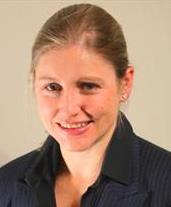 She says she came home with an understanding of how much more there is to learn about the history and political complexities of the region. Marais says she found her visit to Israel “fascinating” and “a lot more complex than I expected it to be”.
She says she came home with an understanding of how much more there is to learn about the history and political complexities of the region. Marais says she found her visit to Israel “fascinating” and “a lot more complex than I expected it to be”.
LEFT: Jana Marais,
editor of Finweek
She has not formed a view on the political situation, other than the fact that she doesn’t see how there will be any progress in solving the political problems under the current leadership on both the Israeli and Palestinian sides.
A crucial step in building bridges would be to ensure that Palestinian citizens of Israel enjoy equal rights to their Jewish counterparts, she says.
Marais’ view is that if the problems are going to be solved, it will have to be done by the people of the region themselves. Outsiders can facilitate, but they can’t stop the indoctrination that is taking place in both Israel and Palestine.
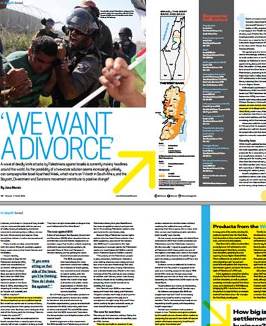 The end of the hatred and violence on both sides will have to come from within.
The end of the hatred and violence on both sides will have to come from within.
PDF OF JANA MARAIS’ 4-PAGE FINWEEK SPREAD
She found the situation in Gaza, which the group didn’t visit, particularly depressing, as there are seemingly no answers from interest groups in Palestine or Israel on how to resolve the matter in a way that would improve the lives of Gazans without compromising security.
From an economic perspective, it is “incredible” what Israel has managed to achieve since independence, given the limited natural resources. “I found it particularly interesting to see to what extent the military is playing a key role in the whole ‘Start-up Nation’ narrative. On the other hand, I also think serious questions need to be asked about the limits Israel imposes on the Palestinian economy, and I really struggle to understand how Israel can justify its continued building of settlements in the West Bank.
“All in all, it has been a great privilege to go there and meet people of that calibre, which provided an insight one would never have been privy to as a tourist,” she says.
- Marais is no lightweight in the world of SA Journalism. After many years in senior positions at Rapport, Beeld, Sake24, Bloomberg News and even a stint in London as correspondent for Metal Bulletin. She lists her particular fields of interest as: commodities, trade and industry, economic policy and labour issues.
Reeva Forman sums it all up
“In spite of the well-known harsh political realities of the Middle East and the Palestinian/Israeli conflict, there is a different reality on the ground, as it were. This is very much in evidence in the socio-economic arena,” says Reeva Forman.
Her latest tour included meetings with all relevant role-players – Israeli and Palestinians, both political and business leaders. She also took the delegates to meet with NGOs consisting of Israeli Jews, Arabs and Palestinians, working in all fields of endeavour to bridge the divide and empower people.
“Now, it seems, the zeitgeist of the world, has come to the same conclusion,” says Forman.
Her approach is now mentioned in Globes which discusses “the stymied peace talks between Israel and the Palestinians”, and notes that “Washington is beginning to show interest in alternative processes of an economic nature”.
US administration officials see the joint projects as confidence-building measures that can pave the way “to a future political solution”.
By exposing influential South Africans to these realities, says Forman, she hopes that “as a people who have experienced our exceptional history of overcoming conflict, we can perhaps help bring a new understanding to the resolution of this tragic and long conflict”.
At the same time, she says, the economy of both Israel and the Palestinian territories can offer vital insights into uplifting our own economy – with the focus on job creation.




